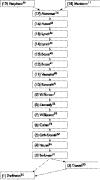Lost in translation: a genealogy of the "social capital" concept in public health
- PMID: 16840764
- PMCID: PMC2588078
- DOI: 10.1136/jech.2005.041848
Lost in translation: a genealogy of the "social capital" concept in public health
Abstract
Study objective: To examine the genealogy of the social capital concept in public health, with attention to the epistemological concerns and academic practices that shaped the way in which this concept was translated into public health.
Design: A citation-network path analysis of the public health literature on social capital was used to generate a genealogy of the social capital concept in public health. The analysis identifies the intellectual sources, influential texts, and developments in the conceptualisation of social capital in public health.
Participants: The population of 227 texts (articles, books, reports) was selected in two phases. Phase 1 texts were articles in the PubMed database with "social capital" in their title published before 2003 (n = 65). Phase 2 texts are those texts cited more than once by phase 1 articles (n = 165).
Main results: The analysis shows how the scholarship of Robert Putnam has been absorbed into public health research, how three seminal texts appearing in 1996 and 1997 helped shape the communitarian form that the social capital concept has assumed in public health, and how both were influenced by the epistemological context of social epidemiology at the time.
Conclusions: Originally viewed in public health research as an ecological level, psychosocial mechanism that might mediate the income inequality-health pathway, the dominance of the communitarian approach to social capital has given disproportionate attention to normative and associational properties of places. Network approaches to social capital were lost in this translation. Recovering them is key to a full translation and conceptualisation of social capital in public health.
Conflict of interest statement
Competing interests: none declared.
Similar articles
-
The privileging of communitarian ideas: citation practices and the translation of social capital into public health research.Am J Public Health. 2005 Aug;95(8):1330-7. doi: 10.2105/AJPH.2004.046094. Epub 2005 Jul 7. Am J Public Health. 2005. PMID: 16006421 Free PMC article. Review.
-
Social capital, economics, and health: new evidence.Health Econ Policy Law. 2008 Oct;3(Pt 4):321-31. doi: 10.1017/S1744133108004593. Health Econ Policy Law. 2008. PMID: 18793475
-
Social capital, income inequality and self-rated health in Chita peninsula, Japan: a multilevel analysis of older people in 25 communities.Soc Sci Med. 2009 Aug;69(4):489-99. doi: 10.1016/j.socscimed.2009.05.006. Epub 2009 Jun 11. Soc Sci Med. 2009. PMID: 19523728
-
The importance of addressing social determinants of health at the local level: the case for social capital.Health Soc Care Community. 2011 Sep;19(5):522-30. doi: 10.1111/j.1365-2524.2011.00999.x. Epub 2011 May 19. Health Soc Care Community. 2011. PMID: 21595772
-
Social capital, disorganized communities, and the third way: understanding the retreat from structural inequalities in epidemiology and public health.Int J Health Serv. 2001;31(2):213-37. doi: 10.2190/NVW3-4HH0-74PX-AC38. Int J Health Serv. 2001. PMID: 11407169 Review.
Cited by
-
The challenges of measuring social cohesion in public health research: A systematic review and ecometric meta-analysis.SSM Popul Health. 2022 Jan 21;17:101028. doi: 10.1016/j.ssmph.2022.101028. eCollection 2022 Mar. SSM Popul Health. 2022. PMID: 35111897 Free PMC article. Review.
-
Social capital and health: implication for health promotion by lay citizens in Japan.Glob Health Promot. 2015 Dec;22(4):5-19. doi: 10.1177/1757975914547547. Epub 2014 Oct 15. Glob Health Promot. 2015. PMID: 25319376 Free PMC article.
-
Getting Old Well in Sub Saharan Africa: Exploring the Social and Structural Drivers of Subjective Wellbeing among Elderly Men and Women in Uganda.Int J Environ Res Public Health. 2020 Mar 31;17(7):2347. doi: 10.3390/ijerph17072347. Int J Environ Res Public Health. 2020. PMID: 32244270 Free PMC article.
-
Social capital and frequent attenders in general practice: a register-based cohort study.BMC Public Health. 2018 Mar 2;18(1):310. doi: 10.1186/s12889-018-5230-2. BMC Public Health. 2018. PMID: 29499678 Free PMC article.
-
The association of neighborhood social capital and ethnic (minority) density with pregnancy outcomes in the Netherlands.PLoS One. 2014 May 7;9(5):e95873. doi: 10.1371/journal.pone.0095873. eCollection 2014. PLoS One. 2014. PMID: 24806505 Free PMC article.
References
-
- Williams S J. Theorising class, health, and lifestyles: Can Bourdieu help us? Sociol Health Illn 199517577–604.
-
- Frohlich K, Corin E, Potvin L. A theoretical proposal for the relationship between context and disease. Sociol Health Illn 200123776–797.
-
- Williams G H. The determinants of health: structure, context, and agency. Sociol Health Illn 200325131–154. - PubMed
Publication types
MeSH terms
LinkOut - more resources
Full Text Sources

